Upon booting up Marvel’s Spider-Man 2, I did what any self-respecting New Yorker would do: I beelined it toward my favorite part of the city as soon as possible, to see how Insomniac Games had recreated the locale. In my case, this meant veering toward South Brooklyn, even as Sandman was wreaking havoc on the infrastructure of Manhattan’s Financial District. However, as I swung beneath the Gothic arches of Brooklyn Bridge, the better to glimpse the steel girders and stevedore cranes of Red Hook from a distance, the vista confirmed what I had feared deep down: My favorite neighborhood wasn’t even there.
A similar disappointment had overtaken me back in 2016. There I was, tearing through the streets of Watch Dogs 2’s San Francisco on a stolen motorcycle, gripping my DualShock 4 in the living room of my house in the Sunset District, my roommates watching with rapt attention as I approached the west side of the peninsula, eagerly awaiting the moment when they could exclaim, “There it is!” But the farmer’s markets, quaint cafés, and intermittent sand dunes of the city’s biggest neighborhood never appeared. Ubisoft had mashed it all into nine measly blocks.
The audacity offends me to this day.

Jokes aside, I totally get it! In video game terms, the Sunset’s massive grid of blocky houses would be about as compelling a playground as a bad Halo Forge map. Red Hook, once the world’s busiest port but now a languid stretch of New York’s harbor front, is anathema to the excitement of Spidey-swinging around a bustling metropolis — as culturally and culinarily wonderful as the neighborhood is. Including it would also expand the boundary of Insomniac’s map, which is already big enough.
This kind of thing fascinates me: When making a digital facsimile of a real-world place, what do developers prioritize? What do they cut? Where do they expand? From Watch Dogs: Legion’s London to Grand Theft Auto 5’s Southern California, creative liberties are a necessity. In GTA 4, Rockstar maintained the general geography of New York City and Hudson County, New Jersey, yes — but it morphed the edges, reshaped neighborhoods, and shifted tectonic plates to make navigation and exploration more compelling. Noclip’s Danny O’Dwyer explored this dissonance at length in a 2016 video essay for GameSpot.
Spider-Man 2’s map is a thrill to traverse as both Peter Parker and Miles Morales, especially with the characters’ new Web Wings, which allow them to glide between glass canyons and over the East River into Brooklyn and Queens. I haven’t fast-traveled once in my 15-hour playthrough, and I intend to keep that streak going, so long as the game doesn’t make me do so. In other words, I’ll leave world design to the experts. But also, maybe Red Hook will appear in Spider-Man 3, anyway.
- SEO Powered Content & PR Distribution. Get Amplified Today.
- PlatoData.Network Vertical Generative Ai. Empower Yourself. Access Here.
- PlatoAiStream. Web3 Intelligence. Knowledge Amplified. Access Here.
- PlatoESG. Carbon, CleanTech, Energy, Environment, Solar, Waste Management. Access Here.
- PlatoHealth. Biotech and Clinical Trials Intelligence. Access Here.
- Source: https://www.polygon.com/gaming/23931711/spider-man-2-new-york-city-red-hook-erasure
- :is
- :where
- $UP
- 2016
- a
- About
- All
- allow
- already
- also
- anathema
- and
- any
- appear
- appeared
- ARE
- around
- AS
- aside
- At
- attention
- auto
- awaiting
- back
- Bad
- BE
- Better
- between
- Big
- Biggest
- Blocks
- both
- BRIDGE
- Brooklyn
- bustling
- but
- california
- case
- City
- compelling
- CONFIRMED
- could
- county
- Creative
- culturally
- Cut
- day
- deep
- Design
- developers
- DID
- digital
- disappointment
- distance
- district
- do
- Doesn’t
- Dogs
- down
- DualShock
- Dusk
- eagerly
- East
- enough
- Entertainment
- especially
- ESSAY
- Ether (ETH)
- Even
- Excitement
- Expand
- experts
- exploration
- Explored
- Favorite
- financial
- For
- Francisco
- from
- front
- game
- Games
- General
- geography
- get
- glass
- Glimpse
- going
- Grid
- had
- harbor
- House
- houses
- How
- However
- HTTPS
- i
- I’LL
- in
- In other
- Including
- Infrastructure
- intend
- interactive
- into
- IT
- Jersey
- jpg
- Keep
- killing
- Kind
- Leave
- Length
- living
- locale
- London
- Long
- make
- Making
- map
- Markets
- massive
- maybe
- me
- meant
- moment
- more
- motorcycle
- my
- Navigation
- necessity
- never
- New
- New Jersey
- New York
- new york city
- New York’s
- nine
- now
- of
- on
- once
- Other
- over
- part
- Peter
- Place
- plato
- Plato Data Intelligence
- PlatoData
- playground
- Polygon
- possible
- Prioritize
- queens
- real world
- Red
- River
- Rockstar
- Room
- San
- San Francisco
- SAND
- see
- shifted
- side
- similar
- So
- Soon
- South
- Southern
- steel
- stolen
- streets
- Sunset
- Swings
- Tectonic
- terms
- that
- The
- The West
- theft
- Them
- There.
- they
- thing
- this
- Through
- to
- TOTALLY
- toward
- Ubisoft
- via
- Video
- video game
- virtually
- was
- watching
- web
- webp
- West
- What
- when
- which
- will
- with
- wonderful
- words
- world
- world’s
- would
- yes
- york
- youtube
- zephyrnet







